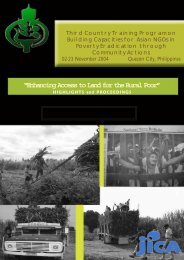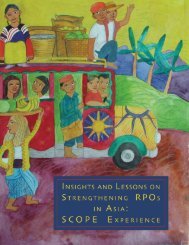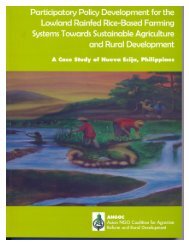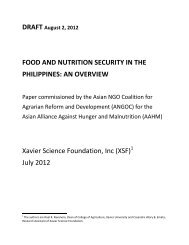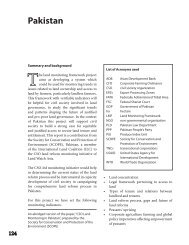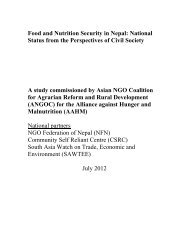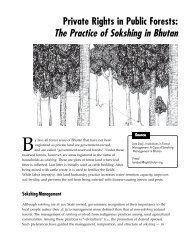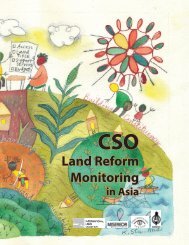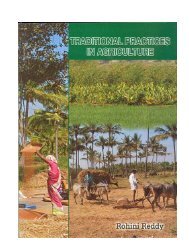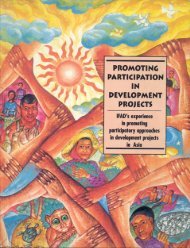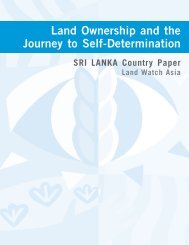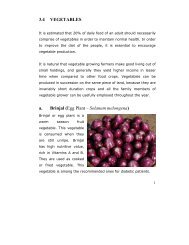In Search of Common Grounds: Forging Land ... - ANGOC Site
In Search of Common Grounds: Forging Land ... - ANGOC Site
In Search of Common Grounds: Forging Land ... - ANGOC Site
You also want an ePaper? Increase the reach of your titles
YUMPU automatically turns print PDFs into web optimized ePapers that Google loves.
<strong>Forging</strong> <strong>Land</strong> Partnerships in the Philippines 13Promoting Access to <strong>Land</strong>through PartnershipThe project “Pursuing <strong>Land</strong> Partnerships in the Philippines: Finding <strong>Common</strong> Groundto Address <strong>Land</strong> Conflicts between Farmers and <strong>In</strong>digenous Peoples,” which wasimplemented by the Asian NGO Coalition for Agrarian Reform and Rural Development(<strong>ANGOC</strong>) from 2002 to 2006, is one <strong>of</strong> four country level multistakeholder mechanisms(the others being in <strong>In</strong>donesia, South Africa, and Guatemala) that emerged following thelaunch in 2002 <strong>of</strong> the <strong>Land</strong> Alliances for National Development (LAND) Partnership.The LAND Partnership, an initiative <strong>of</strong> the <strong>In</strong>ternational <strong>Land</strong> Coalition (ILC), aims t<strong>of</strong>acilitate the implementation <strong>of</strong> Agenda 21, a comprehensive blueprint <strong>of</strong> action to betaken globally, nationally and locally by organizations <strong>of</strong> the UN, governments, andmajor groups in pursuit <strong>of</strong> sustainable development. <strong>In</strong> particular, Chapter 14 (Item14.17) <strong>of</strong> Agenda 21 promotes the equitable access <strong>of</strong> rural people to land and otherresources on which their livelihood depends. Depending on the nature <strong>of</strong> the need that isbeing addressed and on the preferences <strong>of</strong> the stakeholders, LAND partnerships can takethe form <strong>of</strong> alliances, fora, joint commissions , or joint field programs, whose aim is todiscuss, negotiate, and implement policies, programs and service delivery systems thatwould enhance the rural poor’s access to land.<strong>In</strong> early 2003, the ILC started talks with <strong>ANGOC</strong> about the prospects for establishing suchmechanisms in the Philippines. The Philippines’ Department <strong>of</strong> Agrarian Reform (DAR)was invited, and agreed to jointly convene the initiative with <strong>ANGOC</strong>. <strong>ANGOC</strong> alsoconsulted with other institutions such as Non-government organizations (NGOs), farmersorganizations and government agencies that would want to collaborate on land relatedissues. Following these initial discussions, it was decided to conduct a study that wouldassess past and present mechanisms that have been formed by key stakeholders in thecountry in support <strong>of</strong> land related reforms and policies. The “<strong>Land</strong> Study” would alsodetermine how such mechanisms could be improved, and in what ways, and if formingan entirely new mechanism would be the better option.A <strong>Land</strong> Partnership Protocol for the Philippines was signed in Rome, Italy on November7, 2003 by the ILC, <strong>ANGOC</strong> and the DAR. This agreement assigned lead roles to the DAR (onbehalf <strong>of</strong> the Philippine Government) and to <strong>ANGOC</strong> (as representative to civil society<strong>ANGOC</strong>



